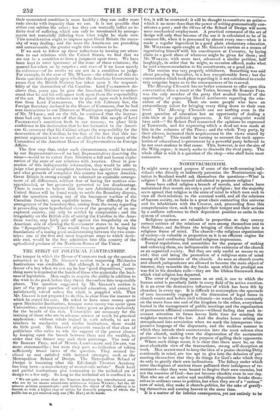THE SPIRIT OF POLITICAL PARTISANSHIP.
THE temper in which the House of Commons took up the question submitted to it by Mr. G1LLON'S motion respecting Mechanics Institutions was creditable. But although it is a good deal in favour of a boy when we can say he has "good dispositions," some- thing more is required at the hands of those who undertake the busi- ness of legislation. Men ought to acquire the ability in addition to the wish to do good, before they thrust themselves into responsible places. The question suggested by Mr. GILLON'S motion is part of the great question of national education, and cannot be satisfactorily solved unless the whole is grappled with. That Mr. G1LLON is not prepared to do this, is clear from the manner in which he stated his case. He asked to have some money spent upon Mechanics Institutions, because some money was spent upon Universities; and represented the latter grant as given exclusively for the benefit of the rich. Universities are necessary for the training of those who are to advance science or teach its practical application : without minds trained in such schools, to act as teachers in mechanics and similar institutions, these would do little good. Mr. GILLON'S argument smacks of that class of politicians who strive to win the support of the poorer classes by keeping open the breach between them and the wealthy, in -order that the former may seek their patronage. The tone of Sir ROBERT PEEL, and Of Messrs. LABOUCHERE and EWART, was more statesmanlike ; but even they gave no indication of taking sufficiently broad views of the question. They seemed in- clined to rest satisfied with isolated attempts, such as the Metropolitan School of Design. The Metropolitan School of Design is becoming what the Edinburgh Trustees Academy has long been—a manufactory of second-rate artists.* Such local and partial institutions give instruction in the technical art of design to a few only. So long as the technical art is confined to a • We are quite aware that the Trustees Academy has manufactured some who are by no means second-rate artists—as witness WILKIE; but the dii oginores gentium preponderate: and besides, the object of the Academy is to furnish us with a higher class of artists for domestic purposes, of whom the public has as yet received only one (Mr. Rev) at its hands. I few, it will be overrated : it will be thought to constitute an artist— which it no more does than the power of writing grammatically con- stitutes a poet ; and the eleves of the School of Design will scorn mere mechanical employment. A practical command of the art of design will only then become of the use it is calculated to be of in common life, when it is possessed by almost every one—when it is made a regular ingredient in a good plain elementary education. Mr. WILLIAMS again caught at Mr. GILLON'S motion as a means of ingratiating himself with his constituents at Coventry, by laying claim to a good share of whatever might be given for them ; and Mr. WAKLEY, with more tact, advanced a similar petition, half laughingly, in order that he might, as occasion offered, make what he said a recommendation to his constituents, or a good joke.
The motion was very properly withdrawn. Something was said about pressing it hereafter, in a less exceptionable form ; but the conversation which took place regarding it is not calculated to excite very sanguine hopes as to the consequences of its renewal.
The Morning Chronicle has no better comment to offer upon this conversation than a taunt at the Tories, because Sir ROBERT PEEL
was the only member of the party that availed himself of the opportunity of expressing liberal sentiments regarding the edu- cation of the poor. There are some people who have an extraordinary talent for bringing every thing down to their own level. The Morning Chronicle can see nothing even in the great question of education but an opportunity of dealing a side-blow at its political opponents. A fair antagonist would have said—" Sir Robert Peel reasserted the opinions he expressed at Tamworth, and for expressing which a dead set was made at him in the columns of the Times ; and the whole Tory party, by their silence, intimated their acquiescence in the views stated by their leader." This would be turning to account the tacit appro- bation of educational improvement by a powerful party believed to be not over-zealous in that cause. This, however, is not the aim of the Whig organ ; it merely seeks to discredit the rival party. The whole affair is with it a question of the shop—who shall have most customers.


























 Previous page
Previous page